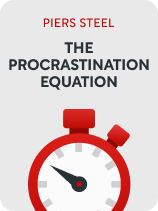

This article is an excerpt from the Shortform book guide to "The Procrastination Equation" by Piers Steel. Shortform has the world's best summaries and analyses of books you should be reading.
Like this article? Sign up for a free trial here.
How can you prevent procrastination? How can building your confidence help you meet deadlines?
The Procrastination Equation by Piers Steel discusses how to avoid procrastination by exploring three areas. These areas include anti-procrastination techniques that will give you the motivation you need to get work done.
Continue reading to learn how to prevent procrastination with Steel’s strategies.
Strategy #1: Manage Distractions and Impulses
Steel notes that since impulsivity causes procrastination, managing distractions and impulses can help you learn how to prevent procrastination. If you avoid things that offer tempting immediate rewards, you reduce the amount of time you spend delaying important tasks.
(Shortform note: You may find that if you wait a few minutes, the procrastination-inducing allure of distractions fades. In Ultralearning, Scott Young suggests setting a five-minute timer whenever you feel the impulse to procrastinate. Commit to working for at least those five minutes. When the timer goes off, you may want to continue working because the urge to distract yourself has passed. If you find yourself frequently choosing to stop working after five minutes, increase the time to 25 minutes followed by a five-minute break. As each period of productivity feels more natural, upgrade to longer periods of time.)
Strategy #2: Make The Task More Valuable to You
Steel’s second strategy addresses the second reason for procrastination—disliking what we’re doing—by making tasks more interesting (and thus more valuable) to us. In today’s world, most work is broken into routine, repetitive tasks that contribute to monotony and boredom, such as doing inventories, entering data into spreadsheets, and writing reports. We struggle to feel motivated to complete these dull tasks because our brains deem them unimportant. Thus, we procrastinate, and the unpleasant work adds up.
(Shortform note: Repetitive tasks may pose workplace problems beyond just encouraging procrastination. Some research shows that the extreme boredom of repetitive tasks can have serious effects on employees’ mental health, making them dissatisfied, dispirited, and desperate to leave the job. When turnover increases, companies incur costs for recruiting and lose time training new employees. Additionally, tasks that involve repeated movements often lead to health problems like tendonitis and carpal tunnel syndrome.)
Strategy #3: Build Your Confidence
Steel’s third strategy is building your confidence to avoid procrastination that’s based on the fear of failure. As we touched on earlier, the less confidence you have in your ability to succeed, the less motivated you’ll be, and the more likely you are to procrastinate.
(Shortform note: Some experts state that procrastination based on fear and lack of confidence also provides an excuse for failure: If our work isn’t very good, we can blame it on not having enough time. It wasn’t a personal failure, but a failure of circumstance. This cushions our self-esteem and allows us to avoid facing the fear that we wouldn’t be good enough even if we did have enough time.)
On the other hand, Steel says that being too confident about your ability to succeed can also result in procrastination. If you believe that everything will work out no matter what, you might wait for success and good fortune to come to you instead of working to make it happen. Additionally, overconfident people often underestimate the amount of time needed to complete tasks, so they wait until the last minute to begin. This can undermine their results.
(Shortform note: The tendency to overestimate our abilities is so common that psychologists have a name for it—overconfidence bias. This bias affects more than just our perception of the time and effort it takes to complete a task: It can also affect our ability to make ethical decisions. Research suggests that we tend to believe we’re more ethical than our colleagues, peers, and competitors. One study found that 50% of the business people surveyed believed they were more ethical than 90% of people. Because of this bias, we often take ethical issues lightly. We assume we’ll do the right thing instead of reflecting properly on what that might be, making it more likely that we’ll make unethical decisions.)To successfully avoid procrastination, you must strike a balance between acknowledging the work it’ll realistically take to complete a task and believing that you’re capable of succeeding.
(Shortform note: Keeping a work journal can help you strike this balance in the workplace. Documenting your experiences with work tasks—including the time it takes to complete them, issues and insights you have along the way, and so on—creates a clear and realistic picture of what you need to do when you’re faced with the task again. Additionally, reflecting on your achievements and having a record of your progress can build your confidence.)

———End of Preview———
Like what you just read? Read the rest of the world's best book summary and analysis of Piers Steel's "The Procrastination Equation" at Shortform.
Here's what you'll find in our full The Procrastination Equation summary:
- Strategies to help procrastinators increase their motivation and control
- How to make unpleasant tasks feel more valuable for yourself
- Why procrastinators are typically less financially successful






